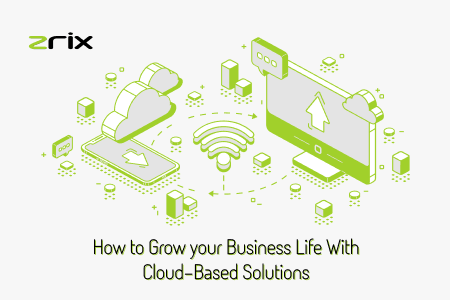All of your files are no longer stored locally on your computer or other devices.
The majority of us still utilize cloud services such as Google Drive, Dropbox, and Apple's iCloud.
These cloud services ensure that files can be uploaded, accessed, edited, and downloaded from any device and any place.
This not only frees up a lot of space on our devices but also allows us to be more flexible with things like remote working.
A central server is in charge of allowing devices to communicate with one another.
Quick Navigation
What does cloud-based technology mean?
Cloud computing makes use of a software infrastructure that is built on cloud-based applications example like Google Docs or Office 365 and stores data on remote servers. Private clouds, public clouds, hybrid clouds, and multi-clouds are the types of cloud applications.
Cloud computing is typically defined by its front-end and back-end. The whole front-end enables users to save and retrieve their data files through a cloud storage application or a web browser. However, the real job takes on behind the screens.
The backend is in charge of safeguarding user data and information, and it includes all remote servers, databases, computers, and central servers involved in data storage. To put it another way, it ensures that you have access to your Cloud-stored photos from both your laptop and mobile devices, anywhere and whenever you want.
There are six benefits of Cloud Technology for App Development
Cost-cutting
You're not alone if you're concerned about the financial implications of switching to cloud computing. The initial expense of adopting a cloud-based server is a problem for 20% of businesses. However, individuals attempting to balance the benefits and drawbacks of using the cloud must consider more than simply the initial cost; they must also consider the return on investment.
Simple accessibility to your company's data once you're on the cloud will save time and money when it comes to project start-up. Many cloud-computing solutions are pay-as-you-go, which is good news for consumers anxious about overpaying for things they don't need or want. This indicates that even if you do not make use of what the cloud would have to offer, you didn't have to waste money on it.
Also Read: How 5G Changes Everything for Mobile App Development
Security
When it comes to implementing a cloud-computing service, many businesses are concerned about security. Even so, how could you be sure that your files, applications, as well as other data, were secure if they aren't stored onsite? What's to stop a cyber criminal from doing the same thing if you can access your files remotely? Well, quite a bit, to just be honest.
According to Rapid Scale, 94 percent of firms improved their security after moving to the cloud, and 91 percent said cloud mobile development made meeting regulatory compliance needs easier. The data encryption constantly transported across networks and kept in systems is indeed the key to this increased security. By encrypting data, hackers and those who aren't authorized to see it have a harder time accessing it.
Multiple security settings could be established dependent just on the user for most cloud-based services as an additional security feature. Only 9% of cloud customers could claim catastrophe recovery in four hours or less, compared to 20percent of cloud users who could.
Flexibility
Every company seems to have a small period to devote to all of its tasks. If your existing IT solutions force you to devote too much time and energy to computer and data-storage issues, you won't be able to focus on meeting business objectives and increasing customer satisfaction.
You'll have even more time to dedicate to the areas of your business that directly affect your bottom line if you rely on an outside organization to handle all IT hosting and infrastructure.
Also Read: Grow your Business Life With Cloud-Based Solutions
In comparison to operating on a local server, the cloud provides enterprises with more freedom. Furthermore, in the condition that your business requires additional bandwidth, a cloud-based service may provide it immediately instead of requiring a complicated (and costly) upgrade to your IT infrastructure.
This increased independence and flexibility can have a substantial impact on your company's overall effectiveness. According to a 65 percent majority of respondents to an Information Week poll, one of the essential reasons for a company to transition to a cloud environment is "the capacity to quickly satisfy business demands."
Collaboration Boosted
If you have two or even more professionals in your company, teamwork should be a major concern. After all, having a team that didn't function together successfully is meaningless. Collaboration is made simple using cloud computing. On a cloud-based platform, members of the team may easily and securely see and share information.
Some cloud-based platforms even offer collaborative and cooperative areas to link employees across your company, boosting interest and engagement. Without the need for a cloud-based solution, collaboration may be feasible, but it'll never be as simple or as efficient.
Quality Assurance
Few factors are as damaging to a company's growth as poor quality and inconsistent reporting. All files are kept securely in the same style in a cloud-based system. You can preserve data consistency, eliminate human errors, and also have a solid record of all edits or modifications if everyone has access to the same information.
Managing information in silos, on the other hand, can result in employees saving multiple files and documents by accident, miscommunications, and polluted data. Hire mobile app developers in USA,
cloud consulting company is also might give quality assurance.
Mobility
Cloud computing enables mobile access to company data via smartphones and gadgets, which, given the fact that there are currently over 2.6 billion cellphones in use worldwide, is a terrific method to assure nobody is ever left out in the dark.
This aspect of mobile computing allows employees having hectic schedules or who reside a considerable distance from the corporate office to stay in touch with clients and co-workers at any time.
For improved work-life flow, you can use the cloud to provide readily available information to sales personnel who travel, freelance employees, or remote employees.
As a result, it's not surprising that companies that prioritize employee satisfaction are up to 24 percent more inclined to grow their cloud usage. These were the benefits of cloud application development.




